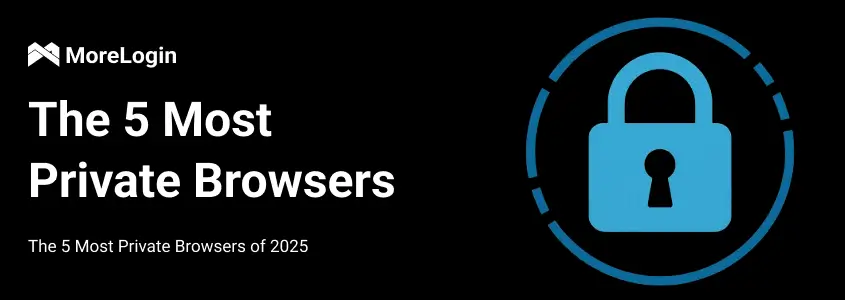
- Product

- Pricing
- Affiliate Program
- Use Cases
- Resource


Online privacy continues to face serious challenges in 2025. As surveillance and tracking technologies evolve, choosing the most private browser has become essential for protecting personal data. This article presents a detailed evaluation of five leading options that prioritize privacy. These browsers offer a range of features suited to different types of users.
The goal is to help readers decide what is the most private browser based on individual needs. A growing demand for secure online experiences has led users to seek tools that do more than block ads—they need full control over their data.
Users expect browsers to protect their privacy while remaining easy to use. Many options claim strong privacy, but not all deliver. The five browsers below have earned a reputation in 2025 for doing both well.
Brave is known for its focus on privacy and performance. It blocks ads and trackers by default, which improves both speed and security. Users can open private tabs with Tor, adding an extra layer of anonymity.
Pros:
Built-in ad and tracker blocking
Optional integration with the Tor network
Fast browsing performance
Cons:
Some websites may not function properly
Fewer extensions than Chrome
Tor Browser provides the highest level of privacy. It routes web traffic through a global network of servers, masking user identity and location. This browser is ideal for users who demand complete anonymity.
Pros:
Strong anonymity through the Tor network
Blocks scripts and resists fingerprinting
Fully open-source
Cons:
Slower browsing speeds
Some websites block access from Tor
Firefox offers robust privacy features with deep customization. Users can adjust settings to block trackers, manage cookies, and prevent fingerprinting. The browser is open-source and regularly updated.
Pros:
Customizable privacy controls
Enhanced Tracking Protection
Active open-source community
Cons:
Maximum privacy requires manual setup
The default search engine is Google
DuckDuckGo Browser prioritizes simplicity and privacy. It blocks trackers and does not store user data. The browser features "Fireproofing" to keep preferred sites while clearing the rest.
Pros:
No tracking by default
User-friendly interface
A private search engine built-in
Cons:
Limited add-ons and advanced settings
Less customizable than Firefox
Vivaldi focuses on customization and privacy. It includes built-in trackers and ad blockers, and the developers emphasize data protection. The browser allows users to control every aspect of their experience.
Pros:
Extensive customization options
Built-in privacy tools
No data collection
Cons:
Based on Chromium, which raises concerns for some
The complex interface may deter new users
Choosing the most private internet browser depends on personal needs and browsing habits. Some users prioritize speed, while others value strict anonymity. Understanding the specific strengths and limitations of each browser helps match the right tool to the right user. The table below outlines each browser's primary audience, core benefits, and any noteworthy drawbacks to consider before making a selection:
Everyday Users: Brave provides the best balance of speed and privacy.
Privacy Purists: Tor Browser stands out as the most private browser for users who require anonymity.
Technical Users: Mozilla Firefox offers advanced settings and strong privacy with some configuration.
Even when using the most private web browser, enhancing protection through additional tools remains essential. Morelogin serves this role effectively by offering comprehensive, multi-layered security for privacy-conscious individuals. It creates isolated browser environments, making it difficult for tracking scripts or digital fingerprints to identify users. This isolation is especially useful for managing multiple online profiles without cross-contamination of data.
Six-layer data encryption protects your information during transmission and while at rest.
End-to-end encryption secures your online communication and interaction across platforms.
Local data encryption ensures that even on-device information remains protected from unauthorized access.
Two-Factor Authentication (2FA) adds a layer of login protection against unauthorized access attempts.
Support for decentralized technologies like Web3 ensures full control and ownership over your identity and digital assets.
By pairing Morelogin with the most private browser that suits your needs, users gain significant advantages in maintaining anonymity, securing sensitive data, and preventing intrusive tracking. For further information, read this in-depth article: Morelogin Security Keeps Your Data Secure.
In 2025, finding the most private browser is essential for protecting personal data and minimizing exposure to online threats. Each browser featured—Brave, Tor, Firefox, DuckDuckGo, and Vivaldi—caters to specific privacy priorities, from smooth performance to advanced anonymity. Users must assess their needs carefully to make the most informed decision.
Choosing the right browser becomes even more impactful when combined with tools like Morelogin. This combination offers layered defenses against tracking, profiling, and data breaches.
You need to know the most private web browsers and keep using them to control your digital footprint.